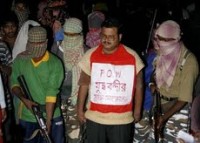Photographers and the Maoists

"Media, Propaganda and the Maoists by Ajitha Menon, writing in the The Hoot, draws out attention to an incident which took place when OC Atindranath Dutta was released in front of the media. She writes that photo journalists were"punished" for clicking pictures without permission from the self-proclaimed Maoists leader." She writes that the photo journalists were"made to beg for mercy in the most humiliating manner by the Maoists". And then writes that"(n)one of the reporters present filed a story on the incident. There was a total news blackout of the insult handed out to the fourth estate by Kishanji".
She raises a pertinent question:
"Are the journalists afraid of being killed? Or are they feared of offending, displeasing, the"mighty" but media friendly Kishanji? Are they so dependent in his phone calls to cover Maoists issues in
I concur with her with an addition that the list must include editors because a lot of news gets dropped, twisted or tailored by editors.
However, while she makes an acute observation and draws our attention to a flaw the example she chose to illustrate her main point shows that she too is innocent about the incident. For one this incident and what happened to photo journalists appeared the very next day in Bengali press. But they also narrated the fact that prior to the release of the OC the Maoists had informed the media that no one should take frontal shots of Kishenji. Why?
The CPI(Maoists) is an underground party. It did not choose to go underground, it had no choice but to do so because under Unlawful Activities Prevention Act they stand proscribed and all activities such as organizing meetings, holding rallies, propagating their views, pointing and circulating literature are banned. Thus any leader of this party must hide his/her identity. Indeed it would be sheer idiocy on their part not to do so. Therefore, asking media not to take frontal shots of leaders is perfectly legitimate. One may not approve of this but they cannot be held responsible for a condition imposed on them. This does not, however, give them license to"punish" the photo journalists. So what did happen?
Yes three photo journalists who had taken frontal shots of Kishanji had their camera snatched and film roll removed. They were then made to kneel down and the squad members asked the gathered media what should be done. Since all of them wanted that they should be pardoned they were set free. She is right that the three photo journalists would have felt intimidated. But being unmindful of the context she over-reads the incident. And assumes that local media, because they are so beholden to Kishenji, as a source, did not report this incident.
In reality they did but they did not play it up as a big deal. Which is strange, because reporters can file stories, however, what to make of it or how much to play it up or not is left to the editor/s. By no stretch of imagination are the corporate owners of media anything other than hostile to Maoists and would have seized on the incident if there was even little bit of meat in it. But they chose not to. I believe here is a case of over-reading an incident, yet making an acute observation on media's dependence on"source/s".
But this also invites attention towards blind spots among even the best among us who continue to remain innocent of the context.
Relevant link:






